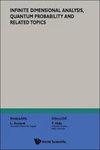QUANTUM-LIKE MODELING OF THE ORDER EFFECT IN DECISION MAKING: POVM VIEWPOINT ON THE WANG-BUSEMEYER QQ-EQUALITY
IF 0.8
4区 数学
Q4 MATHEMATICS, APPLIED
Infinite Dimensional Analysis Quantum Probability and Related Topics
Pub Date : 2023-11-01
DOI:10.1142/9789811275999_0010
引用次数: 0
Abstract
In recent years, quantum mechanics has been actively used in areas outside of physics, such as psychology, sociology, theory of decision-making, game theory, and others. In particular, quantum mechanics is used to explain the paradoxes arising in cognitive psychology and decision making. Wang and Busemeyer invented a quantum model and approach as well as non-parametric equality (so-called QQ-equality), explaining the questions order effect. The primary objective of this note is to test the possibility to expand the Wang-Busemeyer model by considering questions which are mathematically represented by positive operator valued measures. We found that, for such observables, the QQ-equality can be violated. But, we also showed that, in principle, it is possible to reduce expanded model to the original Wang-Busemeyer model by expanding the context of the questions.决策中顺序效应的量子建模:关于wang-busemeyer q -等式的povm观点
近年来,量子力学在物理学以外的领域得到了积极的应用,如心理学、社会学、决策理论、博弈论等。特别是,量子力学被用来解释认知心理学和决策中产生的悖论。Wang和Busemeyer发明了量子模型和方法以及非参数等式(所谓的q -等式)来解释问题顺序效应。本笔记的主要目的是通过考虑由正算子值测度在数学上表示的问题来测试扩展Wang-Busemeyer模型的可能性。我们发现,对于这样的可观测值,q - q等式是可以被违反的。但是,我们也表明,原则上,通过扩展问题的背景,可以将扩展模型简化为原始的Wang-Busemeyer模型。
本文章由计算机程序翻译,如有差异,请以英文原文为准。
求助全文
约1分钟内获得全文
求助全文
来源期刊
CiteScore
1.50
自引率
11.10%
发文量
34
审稿时长
>12 weeks
期刊介绍:
In the past few years the fields of infinite dimensional analysis and quantum probability have undergone increasingly significant developments and have found many new applications, in particular, to classical probability and to different branches of physics. The number of first-class papers in these fields has grown at the same rate. This is currently the only journal which is devoted to these fields.
It constitutes an essential and central point of reference for the large number of mathematicians, mathematical physicists and other scientists who have been drawn into these areas. Both fields have strong interdisciplinary nature, with deep connection to, for example, classical probability, stochastic analysis, mathematical physics, operator algebras, irreversibility, ergodic theory and dynamical systems, quantum groups, classical and quantum stochastic geometry, quantum chaos, Dirichlet forms, harmonic analysis, quantum measurement, quantum computer, etc. The journal reflects this interdisciplinarity and welcomes high quality papers in all such related fields, particularly those which reveal connections with the main fields of this journal.

 求助内容:
求助内容: 应助结果提醒方式:
应助结果提醒方式:


